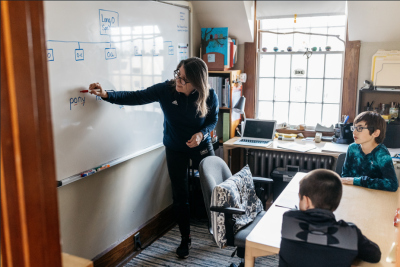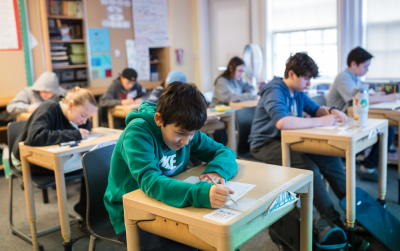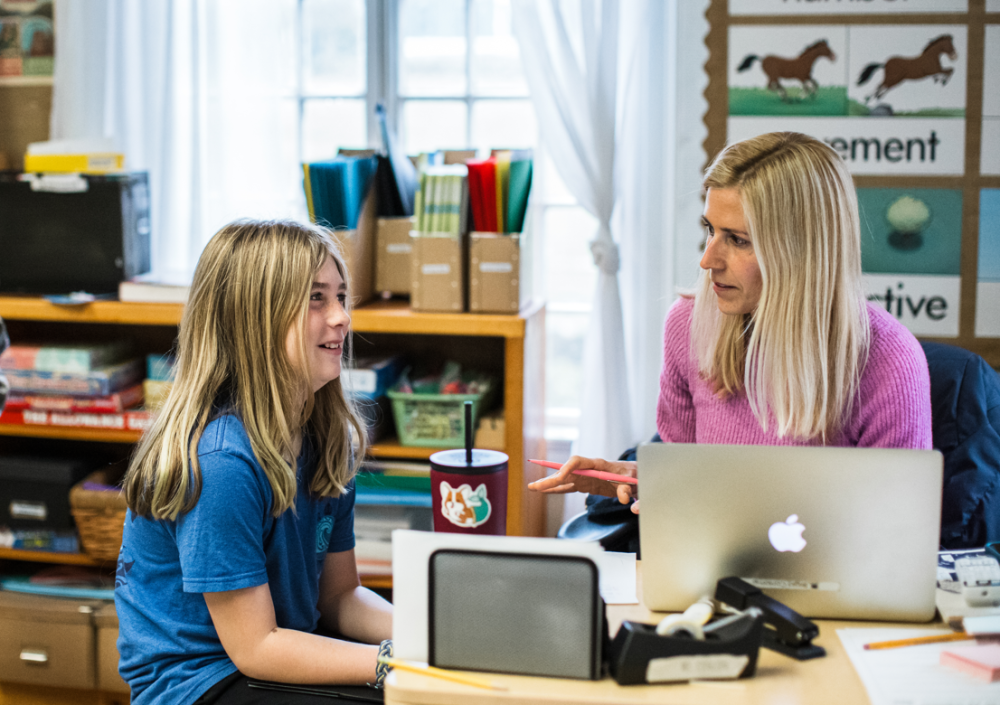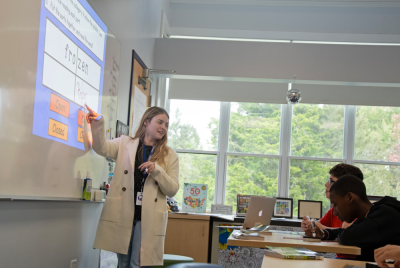Seventeen years of building confidence with dyslexia at Friends Academy


At 8 years old, Dartmouth’s Catherine Sylvia was diagnosed with dyslexia, which is a language-learning difference that primarily affects a person’s reading.
“Some people see it as the words are all jumbled up, but I can see it normally,” Sylvia said. “It's more like every time I try to read, the words don't go to my brain, so I can't process them.”
In the middle of sixth grade, Sylvia transferred into Friends Academy. Though a private school, the academy accepts students who may have learning differences and provides a specialized program to help them. The Sally Borden Program, which is an integrated learning experience that serves students in grades three through eight who have language-based learning differences, was instituted 17 years ago.
With October being Dyslexia Awareness Month, Sally Borden Program Director Analise Brower said it's important for people to understand the prevalence of language-based learning differences, with approximately one in five people, or 20%, of the population having one.
Similar to public schools, the private academy offers literacy assessments to gauge where student strengths and vulnerabilities lie, Brower said. Students are assessed on a broad range of skills, including their ability to break down letters and sound, reading fluency, comprehension and vocabulary.
A freshman at Bishop Stang this year, Sylvia’s Sally Borden days are over, but the benefits of intervention remained as she was able to build her confidence.
She said it was “stressful” joining Friends Academy as a new student where everyone knew each other and in general, she was already a quiet person.
However, after joining the program, she said, “I realized that my grades were higher, and I started to realize that I actually liked writing and speaking in front of people.”
By the time she graduated from the academy, Sylvia had gone from not speaking at all to giving five speeches.
Brower said dyslexia is not just the “letter reversals” that often come to mind and not understanding what is being read, but “it’s much much more complex than that.”
Often strong cognitively and creative thinkers, people with dyslexia are accustomed to using their brains in different ways that lend to these strengths, she said.
In her high school classes, Sylvia said she finds herself sometimes understanding more than her peers in the classroom, such as Latin roots, which “feels good.”
“I was always nervous to read in front of people,” Sylvia said. “I've been doing [theater] since I was in first grade, so I never really wanted to have a big lead, but now that I'm older and I can read my script and stuff, I always try to go for the bigger leads, and I read in front of people whenever I have the chance to.”
This fall, Sylvia will be playing the child of the lead in “It’s a Wonderful Life.”
“They definitely boost up your confidence,” Sylvia said of Friends Academy.
Sally Borden Connect, an external program that started in 2018, also recognizes the prevalence of reading difficulties in students beyond the existing program and offers evaluations, tutoring, teacher training and more. Friends Academy additionally offers the Bridge Program for students in first and second grade, who have indicated a need for intervention.
Dartmouth’s Kit Shilling’s daughter, Caroline, is a fifth grader in the Sally Borden Program who started out as a second grader in the Bridge Program.
“Becoming an independent learner took some time for Caroline, so she has gained skills specific to her deficits, and has really learned how to navigate her education more independently than she has had previously,” Shilling said.
She added how she appreciates how individualized the program is for the students and that literacy assessments are offered periodically throughout the year to keep track of progress and make necessary adjustments.
“She has become much more confident in herself because she's getting the tools she needs to be successful in the classroom,” Shilling said, adding she thinks it's an additional benefit for Caroline to be in a classroom with peers who also learn differently.
Brower said the Sally Borden Program aims to support “students’ skill development and neurological strengthening and rewriting in all sorts of areas pertaining to literacy and executive functioning.”
The intent of intervention isn’t to “cure” someone with a language-based learning difference, but rather to provide the necessary tools for navigating their processing differences in an easier and smoother way, she said.
Brower added, “We're a real difference maker for our students, and they are huge difference makers for our community because of who they are, because of their tenacity and their resilience and their creativity and their personalities and their individual gifts and talents.”















